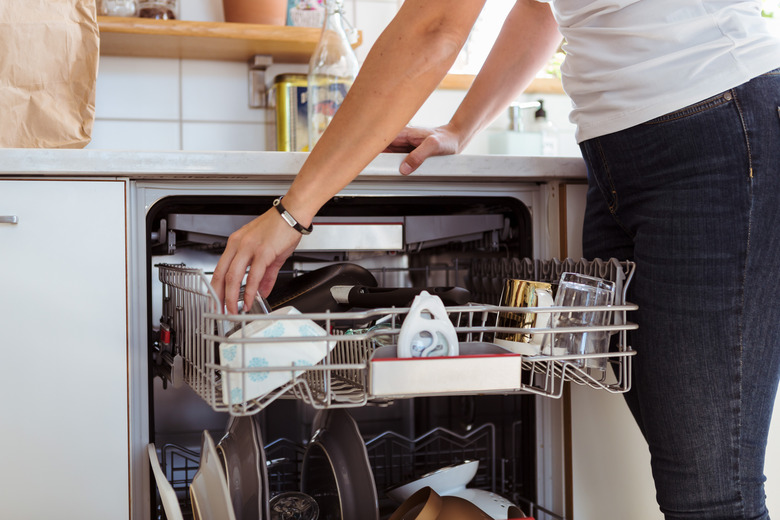What Kind Of Salt Should I Use In My Dishwasher?
If you're forever washing dishes that have spots left after they've dried, then you may live in a hard water area, and that's when it's advisable to use salt in your dishwasher. Folks with soft water don't have to worry about salt. But for those who do, what kind of salt is optimal? And why does dishwasher salt make such a difference?
Why is Dishwasher Salt Necessary?
Why is
Dishwasher Salt Necessary?
In regions with hard water, the calcium and magnesium that make the water "hard" will react with dishwasher soap and create clumps that don't dissolve well. This becomes those dreaded spots no one wants on their glasses.
For a "sparkling" clean, the dishwasher salt is added to the machine, and it will chemically bond with the calcium and magnesium. The salt strips them from the water, and the result is a soft water that then reacts the way it's supposed to when dishwashing soap shows up to bring order and sparkling cleanliness to your dishes.
Where Does the Salt Go?
Where Does
the Salt Go?
There is a dedicated salt compartment in higher-end dishwashers, but not all will have them. If you live in a hard water area, you should invest in a dishwasher with the water softener or salt compartment. This compartment is usually found on the bottom of the unit, not on the door.
But here's the thing: If you don't have this compartment, then it doesn't have a water softener component built into the dishwasher. Adding salt to the machine will accomplish exactly nothing. Plus, adding it to the detergent can inhibit detergent performance.
For machines with the softener component and a salt compartment, which tends to be labelled "salt," there are often indicators that will say when the salt is running low. Keep an eye on this.
Will My Dishes Get Salty?
Will My
Dishes Get Salty?
Nope! The misnomer people have is that the salt becomes part of the wash cycle, but this isn't what happens — at all. After salt enters the water stream, the chemical reaction happens where it bonds to the calcium and magnesium, and they're almost taken out of the equation. There's no salt splashing on dishes nor salt taste leftover. And there's certainly no need for anyone to worry about salt intake, even if they're on a reduced-salt medical diet.
Water will flow through the softening mechanism, where the salt bonds with its buddies calcium and magnesium. These minerals then exit into the wastewater stream while the nice, soft water enters the wash cycle and makes your dishes clean.
If you do ever taste salt on dishes, then it's generally because you've not gotten all the salt into the salt reservoir, or you failed to close the lid properly, so the salt got into the cycle as opposed to just treating the water.
What Kind of Salt?
What Kind
of Salt?
Dishwasher salt is exactly how it sounds: it's salt designed for dishwashers. Don't use table salt, kosher salt or anything else that isn't designed for use in the dishwasher. Table salt may have other compounds in it, whereas dishwasher salt is specifically sodium chloride, which will bond with the magnesium and calcium.
Dishwasher salt is still food-grade, but has larger grains, and most importantly, it dissolves slowly. This slow dissolve will save your machine from having clumps or other issues from using the wrong salt. Home centers and supermarkets should have dishwasher salt available if your area is known for hard water.
The other upside to using dishwasher salt? Your machine will last longer and perform better through its lifecycle, thanks to its inner workings not being clogged up with calcium and magnesium deposits.
